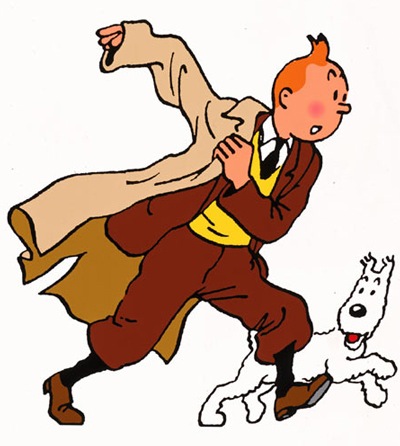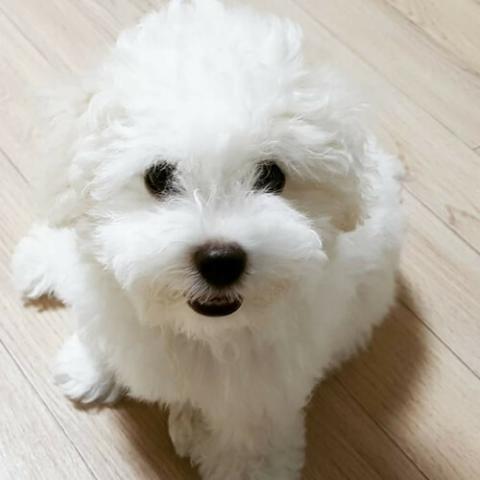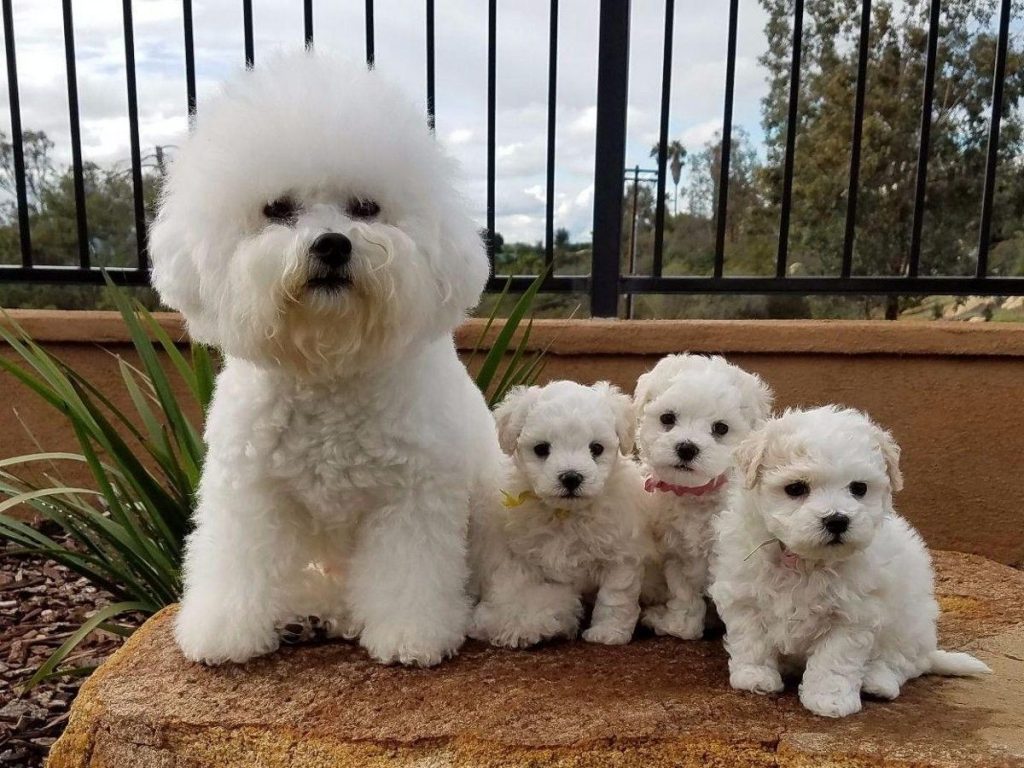Group: Companion Group
Weight: 6.6-11 lbs (3-5kg)
Height: 23-30cm
Life span: 12-15+ years
One of the best small dog breeds for families is the Bichon Frise. A small dog that is generally good with children, and lots of fun! They can bark a lot, but can also be trained to be quiet on command. They require minimum to moderate exercise, and would rate moderate to high maintenance for grooming. These sweet little dogs love to sit on your lap during the evening, while you enjoy tea and a good book.
Bichon Frise Gets Excited Just For You
The Bichon Frise has a unique personality trait. Many owners refer to it as the “Bichon Buzz” or “Bichon Blitz”. During a “Buzz” or “Blitz” the Bichon Frise with run around the house or yard in a crazy burst of excitement. In some cases this includes jumping and bouncing off furniture and running from room to room or place to place with no reason, just spur-of-the-moment excitement! Barking usually accompanies this behavior, but it is meant out of shear joy. Each “Buzz” or “Blitz” is unique for only those that witness it to see!
Bichon Frises love to be the center of attention and aim to please. They love making you laugh.
Grooming And Coat Care For a Bichon
The Bichon Frise has a hypoallergenic coat. However, allergies can vary considerably by individual so although the breed might be easy on some people with allergies to pet dander, this breed may not be ideal for everyone with allergies to pet dander. These dogs do shed, but regular grooming keeps this to a minimum and therefore is less like to exacerbate any allergies.
Owners suggest brushing the dog on a daily basis and getting a professional bathing, cleaning and grooming done about every three months. The eyes need daily cleaning to wipe the tear stains that appear on the dogs delicate white fur. This dog does require a lot of time on a daily basis and is best for families that can provide the time to properly care for the dog. Having older children to share in the responsibly is recommend over having children that are still young enough to require lots of care themselves.
Bichons are suitable apartment dogs, but still need a long daily walk to help burn all their energy!

Bichon Frise: The Popular Cartoon Dog?
The Bichon Frise is a small dog whose breed originated in Spain and Belgium and later moved into France. The name Bichon Frise is French for “curly lap dog”. This light-shedding, hypoallergenic breed is noted to be of medium-high intellect, making them easier to train and great companion dogs that interact well with children and other animals.
The Bichon descended from the Water Spaniel and was used in trade by the Spanish sailors as they travelled the continents. In the 1300’s, Italian sailors highly regarded the breed and the Bichon Frise became popular with Italian nobility.
Since the days of sailing the Bichon loves water and retrieving games, and is a great companion to humans. The breed had great success in France during the Renaissance period, adored by King Francis I in early 1500’s and also by King Henry III in the late 1500’s. By March 5th, 1933 the purebreds were accepted into the Societe Centrale Canine, in France.
Anyone who is familiar with the “Tintin” books would know of the little white dog named “Milou” or “Snowy”. The breed was recognized in Australia in the 1960’s and was brought to the United States in 1955. The Bichon Frise purebreds were officially recognized by the American Kennel Club in 1973.
Bichon Frise Health
Although most dogs will be healthy, this breed is predisposed to some health issues. Asking about your dogs health status with breeders or shelter staff is the best way to purchase a dog in optimum health. Following up on a regular basis with a trusted veterinarian with help maximize your dog’s longevity. Some of the common health problems in the Bichon Frise breed may include:
Cancers -Usually occurs in aging Bichons and can affect various organs. Treatable with chemotherapy and/or radiation, but may not be curable. Only a veterinarian can offer the best advice for treatment and prognosis based on the individual dog, type of cancer and severity of the cancer at time of diagnosis
Liver Failure – Treatable with diet modifications and medication if necessary. Usually occurs secondary to liver shunting.
Autoimmune Hemolytic Anemia (AIHA) -Can be congenital, or brought on by a toxin or parasite. The condition results in the dog’s body failing to recognize it’s own red blood cells. Therefore, the dog’s immune system destroys the red blood cells in a failed attempt at self defense. Anemia results. The condition can be treated by medication, blood transfusion or surgical removal of the dog’s spleen. This condition may not always be curable.
Immune-Mediated Thrombocytopenia (ITP) -Is a hereditary disorder in which the dog has low levels of platelets, which are cells in the blood responsible for blood clot formation. Dogs with ITP are at higher risk of developing bleeds, and being unable to clot when injured. Some dogs develop minor bleeds, such as nose bleeds with prolonged bleeding times, and in some cases the disorder is severe, leading to internal bleeding that can become a major medical emergency. Treatment for ITP consists of medication and blood transfusions, but there is no cure. Develop a good relationship with a veterinarian and see that veterinarian consistently to maximize your dogs symptomatic treatment options.
All breeds are susceptible to specific disorders. Each breed can be affected to varying degrees. The idea of listing the common illnesses for each breed is not to discourage you from wanting a specific breed if you find it a perfect fit for your family; but to help you better prepare for the future health of your dog. As well as provide you with the knowledge necessary to get a dog in the best optimum health.
Like people, it is not possible to predict what a dog’s health may be over the course of their life time. Just as with people, some are very healthy with only mild, acute needs for medical care, while others develop chronic issues needing life long care support. Still others may need emergency medical care due to accidents, illness or injury.
I encourage owners to develop a strong relationships with a consistent veterinarian who the owner and dog both can bond with. Adequate medical care is a financial expense, but a necessity for being a responsible dog owner.
-

Mother Bichon Frise and puppies.
Do you own a Bichon Frise?
Tell us about what a wonderful family dog Bichon Frise’s make!



